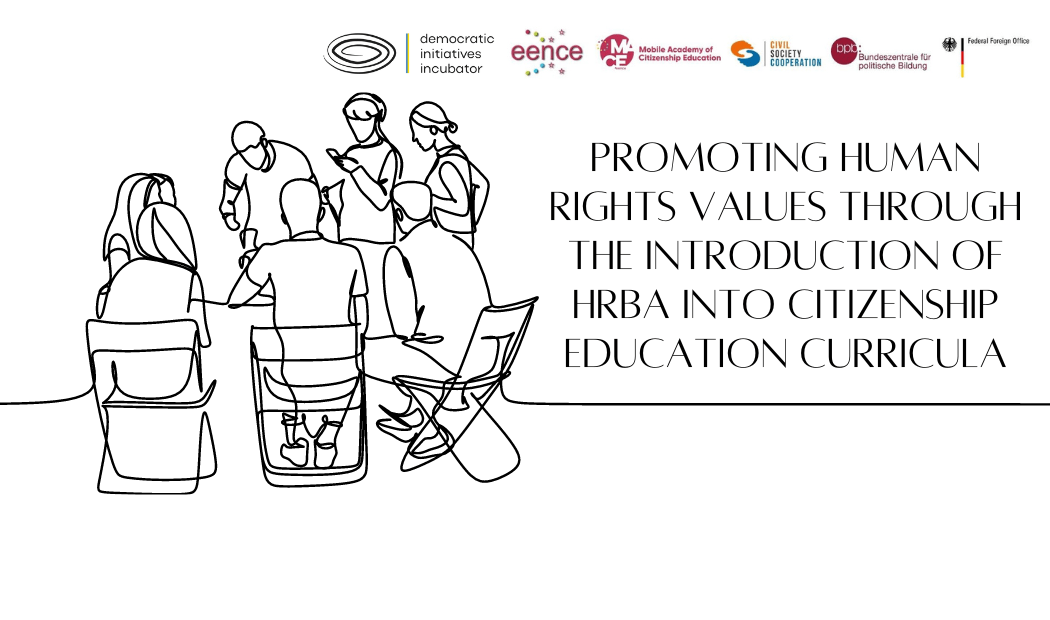Human rights based approach in citizenship education curricula
The Democratic Initiatives Incubator in partnership with Eastern European Association for Citizenship Education invites you to an online course “Human rights based approach (HRBA) in citizenship education (CE) curricula”, which will be held on 20 September – 1 November. Participation in the event is free of charge.
Languages: The meetings will be held in Ukrainian, Belarussian or Russian, with simulation translation into English.
Course Topics (19.00-20.30 UTC/GMT +3):
20.09: Introduction and methodology of HRBA in СЕ;
27.09: Universality of HRBA and CE competencies;
04.10: Indivisibility as a principle of CE/HRBA;
11.10: Equality and non-discrimination as a part of HRBA in CE;
18.10: Participation as a common principle of CE and HRBA;
25.10: Accountability as an instrument of HRBA in CE;
01.11: Final meeting.
Platform: Zoom
Participants throughout the course will be invited to attend each webinar, and there will also be a separate public announcement for those who wish to attend only the specific webinar.
After online course YOU will
- – increase applying of HRBA and its components in your CE programs;
- – get the ideas on how to change your own CE program taking into account HRBA;
- – took a chance to share practices and values of HRBA.
Participants who took active part in all meetings will receive an international certificate acknowledging their participation and learning free of charge!
How to participate?
Fill out a short application form by September 19: https://forms.gle/R56VBCGDvWCuQyES6
For additional questions, please contact hrba4ce@gmail.com
We also invite you to subscribe to the social networks of the Democratic Initiatives Incubator:
Facebook: https://www.facebook.com/DII.Ukraine/
YouTube: https://www.youtube.com/@DII.Ukraine
Instagram: https://www.instagram.com/DII.Ukraine/
Telegram: https://t.me/DII_Ukraine
and our project page in LinkedIn
https://www.linkedin.com/company/hrba4ce/
Human rights (HR) values promotion in citizenship education (CE) in the region has shown to be ineffective due to the influence of communist education values and culture. This is seen in non-perception of the HR concept by educators, the inability to build a direct link between reality and the values they broadcast in professional activities. As an additional barrier, there is a permanent risk of repression, fragile democratic institutions and weak citizenship participation. The fact that the HR education in the region is in a stagnation and that there is a lack of development in this area is proved by numerous researches, including the needs of citizenship society.
It is worth recognising that in reality there is no single universal “recipe” for developing and implementing a human rights-based approach.
Nevertheless, in 2003 UN agencies were able to agree on a number of key parameters that should form the basis of development cooperation. They will form the basis for the work of this project. In this way, the project will be a unique space for development cooperation, fostering the capacity of both ‘duty bearers’ to meet their obligations and ‘rights holders’ to assert their rights through citizenship education.
Initiatives of educators, NGOs, educational institutions in the region and abroad will receive tools to promote HR values that can overcome the influence of “sovietness” in their own activities.
Thus, the CE community receives a “soft” tool for the HR values promotion, which will be developed and validated through the project and promoted after the end of the project.
The project is organised by a consortium of EENCE experts and organisations, funded by the Federal Agency for Civic Education (Bundeszentrale für politische Bildung / bpb) with funds allocated by the Federal Foreign Office of Germany, programme “Expanding Cooperation with Civil Society in the Eastern Partnership Countries and Russia”. The project is implemented by the NGO “Democratic Initiatives Incubator” (Ukraine).


